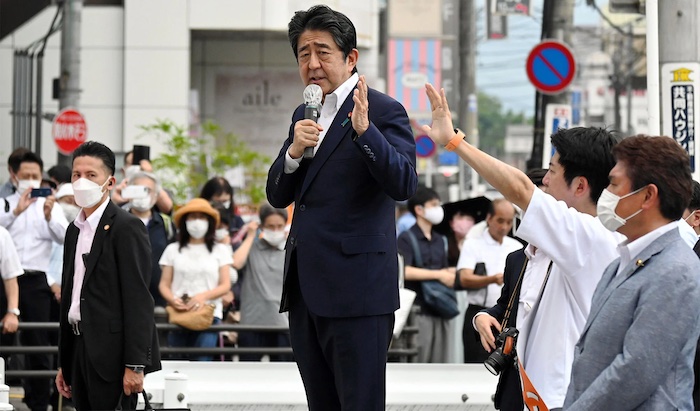Shinzo Abe, the former prime minister of Japan, was killed on Friday by a gunman who shot at him from close range while he was giving a campaign speech.
The murder of the 67-year-old man, who had been Japan’s leader for the longest time, shocked the whole country and made people all over the world feel sad and angry.
Japan has strict gun laws and low rates of violent crime, so it was even more shocking. Prime Minister Fumio Kishida called it a “barbaric act” that was “absolutely unforgivable.”
Abe was shot around noon while campaigning in the western part of Nara before upper house elections this weekend.
He was taken to the Nara Medical University hospital by helicopter, where he was declared dead a few hours later.
“At 12:20 p.m., Shinzo Abe was taken to the hospital. When they got there, his heart had stopped beating “said Hidetada Fukushima, who works at the hospital as a professor of emergency medicine.
“Help was given to keep the person alive. But, sadly, he passed away at 5:03 p.m.”
Fukushima said that Abe had been shot twice in the neck and died from massive blood loss, even though he had received a lot of blood transfusions.
After Abe’s death was confirmed, Kishida told reporters that he didn’t know what to say because he was so sad.
He had already stopped campaigning and taken a helicopter to Tokyo, where he spoke out against “a barbaric act during election campaigning, which is the foundation of democracy.”
“It is a terrible thing to do. I am very angry about what was done.”
The attack happened while Abe was giving a stump speech. There was security there, but people could easily get close to him.
NHK showed footage of him standing on a stage when a man in a grey shirt and brown pants came up from behind, pulled a gun out of a bag, and started shooting.
At least two shots look like they were fired, since each one made a cloud of smoke.
As people and reporters ducked, security tackled a man to the ground, and he was arrested.
Local media cited police sources to say that the man was Tetsuya Yamagami, 41, and that he was a former member of the Maritime Self-Defense Force, which is the navy of the country.
Local media called the gun he was using a “handmade gun,” and NHK said he told police after he was caught that he was “aiming for Abe with the intent to kill him.”
People who were there said they were shocked when the political event turned into chaos.
A woman told NHK that the first shot sounded like it came from a toy bazooka.
“He didn’t fall, but there was a loud noise. On the second shot, the spark and smoke were easier to see.”
Officials from Abe’s Liberal Democratic Party in the area said that there had been no threats before the incident and that his speech had been publicized.
After the attack, senior members of several parties said they would stop campaigning. However, the LDP and its coalition partner Komeito later said that campaigning would start up again on Saturday.
The attack shocked people all over the world. Ursula von der Leyen, the head of the European Commission, tweeted that the “brutal and cowardly murder” had shocked the world.
“I am shocked and saddened by the deadly attack on Shinzo Abe,” said German Chancellor Olaf Scholz.
Yoon Suk-yeol, the president of South Korea, called the murder a “unacceptable act of crime.”
“Deeply sad and shocking,” they said.
Abe was in office for one year in 2006 and again from 2012 to 2020. He had to step down because he was sick with ulcerative colitis, which made it hard for him to move around.
He was a hawkish conservative who pushed for Japan’s pacifist constitution to be changed to recognize the country’s military. Even after he resigned, he was still a well-known politician.
Japan has some of the strictest gun laws in the world, and the number of gun deaths in the country of 125 million people is usually less than 10 per year.
Japanese people have to go through a long and complicated process to get a gun license. First, they have to get a recommendation from a shooting club, and then they have to go through strict police checks.
Corey Wallace, an assistant professor of Japanese politics at Kanagawa University, said that the event reminded him of the stabbing death of Inejiro Asanuma, the leader of the Japan Socialist Party, by a right-wing youth in 1960.
He said that Japanese politicians and voters were used to a style of campaigning that was personal and up close.
He said, “This could really change.”
